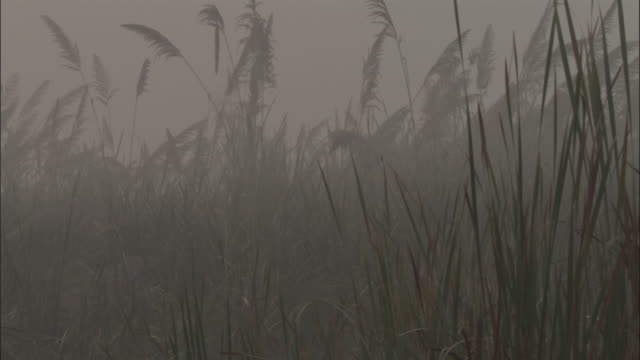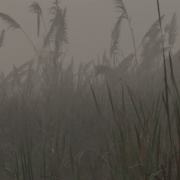MONTHLY BLOG 112, ON RECONSIDERING THE (INTERRUPTED) FUTURE
If citing, please kindly acknowledge copyright © Penelope J. Corfield (2020)

| Fig.1 Silhouettes of grass in fog |
It is not possible to learn from the future that has not yet unfolded. The unidirectional nature of Time forbids it. So when people assert airily: ‘We don’t learn from the past’, I am incredulous. What? Of course, humans must learn from the past because they can’t learn from the future – and the unstable present, in which they learn, is constantly morphing, nano-second by nano-second, into the past.
However, while humans can’t learn from the future, it is certainly pertinent to think again about future expectations, now that routine life has been so suddenly interrupted. Diaries that were full of engagements and plans have suddenly been voided. The clear future has become foggy. It’s disconcerting but educational, particularly for those, like myself, living voluntarily under something near to house-arrest for the duration of the health emergency.
In fact, humans have a lot of advance knowledge about the long-term future. One certainty, confirmed by universal past experience, is that all living creatures will, sooner or later, die. Generally, however, humans manage to live their daily lives without dwelling on that thought. But, in the middle of the Coronavirus pandemic – a contemporary plague – an awareness of the reality and ubiquity of death is sharpened. It’s a valuable jolt. Remember to finish projects; to express affection; to help others; to enjoy every immediate minute; to make the mental leap into long-term history which will continue whatever; and to breathe deeply.
Then there’s the immediate future. That’s much more under personal control. Coming through the fog more clearly. Living indoors and making minimal trips outside heightens appreciation of the usefulness of daily routines. It helps to have a structure to the day, without over-organising. Remember to exercise; to laugh; to contact friends; to eat healthily; to think about others; to do a daily crossword; to study history; to tend the plants; to listen to music (sometimes to sing); and (vital for me personally) to write.
Yet the most problematic area of the suddenly interrupted future is the uncertainty of the intermediate span of the soon-to-follow weeks, months and years. Very far ahead will look after itself. Close at hand can be managed. But the intermediate future is the foggiest of all. Very disconcerting. For how long will the lockdown continue? Will the containment policy work? For how long will the population consent to the current state of affairs? Will historians judge the government’s efforts kindly or unkindly? Will the laid-back Swedish approach to the health emergency prove to have been the right one? How far will life in Britain be radically changed once the crisis is over? No-one knows.
Informed guesses can be ventured, based upon past experience. One pattern suggests that the people – and particularly those at the ‘foot’ of the social hierarchy – will want major reforms, after the great upheaval and sacrifices of a collectively fought war. Yet the actual outcome is unknown.
The foggy shapelessness of the intermediate future contains threats and promises. Remember to roll with the punches; to keep a measured optimism; to avoid being disconcerted by history’s capacity to spring surprises; to recall also the staying power of history’s deep continuities; to be ready to resume life outdoors and on the move; to enjoy hugging friends and family again; to look for the wood in the trees – the big picture in the daily details – the pattern emerging from the fog; and, above all, to embrace the unknown future, which will become the past from which humans can learn. Unseen, social energies are being recharged. Through the fog, community options are emerging. Yet only Time will reveal the precise story, as it always does.
For further discussion, see Twitter
To read other discussion-points, please click here
To download Monthly Blog 112 please click here

